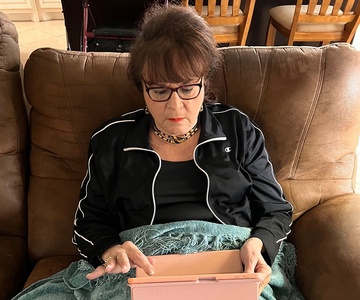Taking A “Sofa Sabbatical” And Making It Work for You

On June 29, while on a cruise in Alaska, I fell, broke my femur in two, and sheered off the ball at the top. We were in Glacier Bay, a beautiful place I never got to see, because I spent 30 hours in pain in the ship’s hospital. The next day, I was loaded into an ambulance and got emergency hip replacement surgery in Ketchikan, Alaska. I’ll be forever grateful that an amazing, world-class orthopedic surgeon chooses to live in a town of 14,036.
For the entire month of July, I’ve lived on the couch.
The whole month has been a blur of sleep, pain, too much TV, sleeping on the couch, pain medications, sleep, more TV, and pain. Did I mention sleeping? Ahh, God bless the man (or woman) who invented Oxycodone! I know it’s habit-forming and addictive to some. But, wow, did it do the trick for me. Also, God bless the person who invented the modern recliner!
31 days later, I am back. I am writing at the computer with a clear head. I am doing laundry. I am back to a reasonable schedule that only involves 8 hours of sleep at night, and 3 during the day.
I’ve learned a lot about life in the last 31 days during my couch sabbatical. If you have suffered an injury, a job loss, or another loss of any kind, you might find you also need time, on the couch, alone. You might just need a week—or a month, or two—to get yourself back together.
Here are some ideas I implemented that might help you:
- Establish a schedule so you feel more grounded in life. In the early days, establish a schedule and take the medications by the clock. (You will very soon want to cut back and take on an as-needed basis.) Also, continue a regular pattern of meals and bedtime. I think this goes for job loss, too. Having a job-less schedule can help you feel more productive, confident, and grounded.
- Slow down. Realize that it is OK to sleep away an afternoon. It might be the healing you need for your mind or body. It’s OK not to be productive every day. For those of you who really know me, you know this is a BIGGIE.
- Remember, you are valuable. People in your life are depending on you to be YOU. They are depending on your point of view, your advice, your joking around, your teasing, your listening, your empathy, and your wisdom. All of that. Even if you’re on the couch, you can cheer another person’s day.
- Listen to your body. One day, after eating mostly carbs and “comfort food” for days, I woke up and wanted a salad. It was refreshing. In the days after that, I added more fresh foods and enjoyed them more than I have for years. Your body knows what is good for it. Listen, and pay attention.
- Forgive your spouse for nearly anything. It’s important to remember that your loss, and your injury is happening to them, too. Their life is turned upside down. They have new tasks and duties. They are worried about the bills, too. They are living on the edge, too. Help won’t always be offered when you need it. Courtesies might not be extended. Hurt, anger, frustration, and upset may come pouring out. This might be the time to just say, “We’re both doing our best.” And, let it go.
- Remember: This, too, shall pass. This is probably the toughest one. When you’re in pain, when you hurt—emotionally or physically—it’s hard to imagine that it will be over. And, sometimes quicker than you could have imagined. One morning, I woke up without pain in my hip. I was able to skip pain medications until noon. The next day, until 2:00 PM. Then, I would have a bad day, and get discouraged all over again. But circumstances keep changing. Soon, I had two mornings in a row without pain. The interview you’d hoped for could come through. The job you thought you’d lost can come back to you with a phone call.
- Turn to your faith. I was lucky to have a bevy of friends and family members who supported me during this time. I had my prayer warriors praying for my blood clots to dissolve, for my hip to heal, for my pain to subside, and for my marriage relationship. Do you pray for a new job? Of course! Prayer works. And, if you don’t believe that, know that prayer makes you feel better.
OK, that’s it for today. I might need a morning nap.
Just wanted to let you know that I’ve transitioned now from Oxycodone to Oxyclean, from the couch to the computer. I’m here to help if you need me.
On your side,
Catherine Jewell
The Career Passion® Coach
PS: If you have a friend in need of career help, remind them they can make an appointment for a free consultation by phone, using this link.